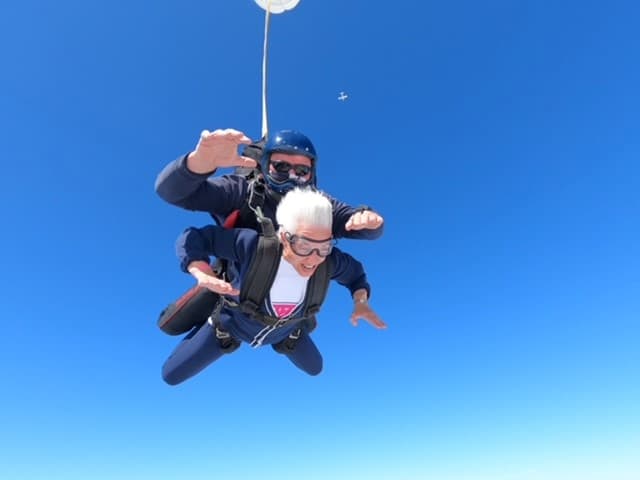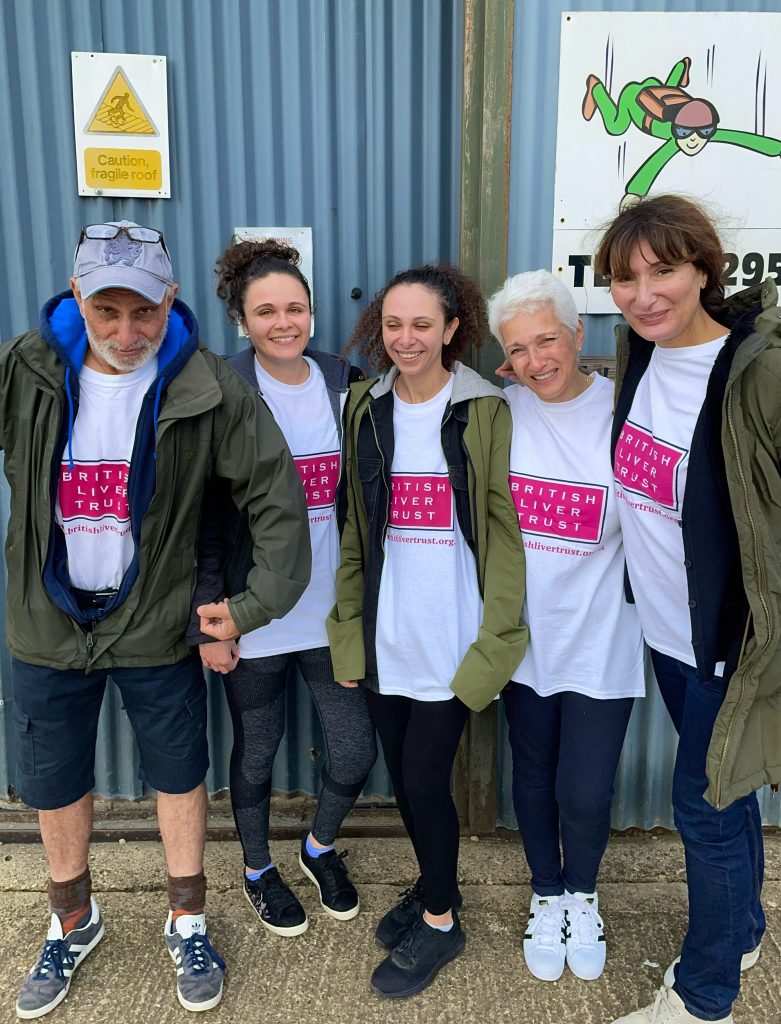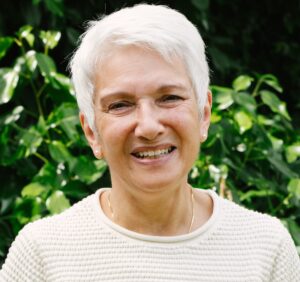Monica was diagnosed with liver cancer on her 61st birthday and had a liver transplant. Since then she has taken part in the Transplant Games, mentors patients pre and post transplant and is part of the British Liver Trust’s online support groups. Thank you for sharing your story, Monica
I’m seven years post-transplant now, but my story started 38 years ago when my mum passed away suddenly from liver cancer. She was only 62. We were completely unaware that she had cancer, it was a very short illness. The autopsy revealed she had hepatitis B, unbeknownst to anybody.
Shortly after this discovery I was tested and found to also be a carrier, almost certainly passed onto me at birth unknowingly by my mother. The only real advice I was given at the time was that when I was in any medical setting, I must say that I was a carrier and that’s sort of how it was left, other than both my children were vaccinated against hepatitis when they were born. As far as I was concerned, that was it.
Fast forward to when I was around 60, and I just started to feel as if something was quite right. Persistently tired, very pale and slight thickening around my middle. Initially I put these little things down to the menopause.
What made me go to the GP was almost vanity, because my hair started to fall out and it was really noticeable. I went to a female GP at a menopause clinic, who did few blood tests, and I had a scalp biopsy. It sounds ridiculous after I’ve had a transplant, but I can’t tell you how much the scalp biopsy hurt!! There was nothing much to suggest there was a problem, but some of the blood tests showed I was slightly anaemic. The GP wanted to do a few more tests and, because of the family history, thought it may be worth referring me to a gastroenterologist.
Hepatologist referral
This appointment revealed my liver was now starting to harden a bit, and I was pleased it had been found early, never for a second expecting what was to come. After some further blood tests, I saw a hepatologist who referred me to King’s College Hospital in London. A FibroScan confirmed my liver was hardening, so I was prescribed antivirals and told they’d keep an eye on me.
I then had a follow-up appointment on my 61st birthday, a day which I’ll never forget. The registrar said: “Monica, I’m so sorry, but you’ve got what your mother had.” My mum had passed away aged 62, and here I was at 61.
A transplant was not mentioned at this point, but the registrar said I would be referred to the liver unit. I was seen really quickly, had some in-depth scans and a biopsy, and my bloods kept suggesting something wasn’t quite right.
I began to notice that I was losing some muscle in my arms – which again I thought was just age and that I was getting bingo wings, then I noticed it on my calves as well. The tiredness was becoming quite marked. I had more in-depth scans where a tiny tumour was found. It was good news that it was tiny, but it was sat in a very bad place – right next to my portal vein. The idea was that I would have a portal vein embolisation, where one of the veins going into my liver would be tied off so the part of the liver where the tumour sat would die. I would then have surgery to remove the dead part in the hope that the rest of my liver would regenerate.
They started the operation, but an hour in they had to stop because the surgeon realised, my liver was far too cirrhotic and ‘unable to sustain life’ so now my only option was a transplant. I don’t think I was really taking it in. It was happening to me, but I felt I was looking down on myself. I also firmly believe someone was also looking down on me, because of the amount of luck I had going forward in this awful situation.
So, I was sent back to the ward for a series of tests to see if I was suitable to go on the transplant list and thankfully, I was. Not everybody is, and as cruel as it may sound the organs are so precious they need to go to a recipient who is well enough and it’s a really fine line. I’m glad it’s not me making these decisions.
Just nine days later I had the phone call saying there was a potential liver for me. They will never say for sure because it’s only after more blood tests, when they have the organ, and the recipient is on the operating table that the surgeons can make the final decision.
The liver was a perfect match for me and I was transplanted that evening
The liver was a perfect match for me, and I was transplanted that evening. The operation is normally five to ten hours, with me they were finished in just four, and by 5pm the next day I was on the recovery ward. I got up after four days and had a shower which was wonderful. The nurse had to come and look for me because by the time I came out I looked like a lobster, but I can’t tell you the difference in how I felt afterwards. I came home after 12 days.
I’ve got a few side effects, but that’s from the post-transplant medication and it’s a very small price to pay. I feel like the poster girl for liver transplants.
As I had recovered so well, I trained to become a mentor for both pre- and post-transplant patients about 18 months after my transplant. This involves going on the ward after people have had their transplants and speaking to those who are happy to have a chat. It was a bit harder during Covid where we had to switch to Zoom or a phone call, and we still offer pre/post patients one-to-ones if this is what they need. I joined a very good support group at King’s Liver Unit called Listen, which is peer led and there to support all listed/post-transplant patients, and I’m part of that committee.
I’m also now a volunteer for the British Liver Trust. I attend the virtual support groups for people with cancer, pre and post transplants and Hep B. One of the members said to me: “What I like about you, Monica, is that you’re always so positive”. That’s exactly what I’m hoping to get across because the day you’re told you need a transplant – even if you’ve been waiting a number of years – it’s still a shock, I just can’t describe it. But it doesn’t have to be the end – there really is life after transplant – that’s my main mantra. To prove this point I did a tandem skydive for the British Liver Trust with my brother and sister and two of my nieces and we managed to raise just over £5,000. If anybody had said to me, on the day I was told I needed a liver transplant that within a couple of years I would be jumping out of plane at more than 13,000 feet I would never have believed them!!
Keeping fit now is one of my main things and I’ve taken up 5k and 10k walks. I can’t really run anymore as I get a bit breathless probably because of the side effects of the immune suppressant medication but that’s something I just have to cope with. Other than that, everything’s great. Where possible I do the Saturday morning 5k Park Walks, and I’m a huge advocate of Rehab Pilates which I try and do two to three classes a week.
Transplant Games are fantastic
I’m also an advocate of anyone going to the Transplant Games. I went for the first time in 2022 and didn’t realise how well attended they are. I was a late entry and by that point the only event that was open was a donor run, so I thought ‘Yes! Let’s do that because you don’t have to run, you can walk it’.
The evening before they had the opening ceremony, and it was fantastic. Each hospital that was represented came in with their placards, first all the adult donor recipients, and then the children, from the various hospitals, with their parents, oh my goodness it was so emotional. But the most poignant was the last group to come in – the donor families. I felt quite humbled. The Transplant Games are such an inclusive event that for me being part of it was such a feeling of a sense of achievement. You do not have to participate in a sport, you can go as a volunteer or just go as spectator.
I went again this year (2024) and took part in the Ladies 3k walking race, coming fourth in my age category (out of a field of another 11 ladies all in same age 60-70 category). I also finished 5k Donor Race/Walk in about 43 minutes and ran the last few metres!
What I’ve learned along this cancer/transplant journey, is not to put off something that you can do today until tomorrow and I’m a real advocate of early detection. I was unbelievably lucky because although I had very few outward symptoms, my liver disease was picked up so early because both the consultant and registrar kept looking, unlike my mum 38 years ago. Nobody thought to look for cancer with her until it was far too late.
I also bang the drum to ladies of a certain age of which I’m still one. Please don’t just put everything down to the menopause, if you feel something is quite right seek medical advice.



